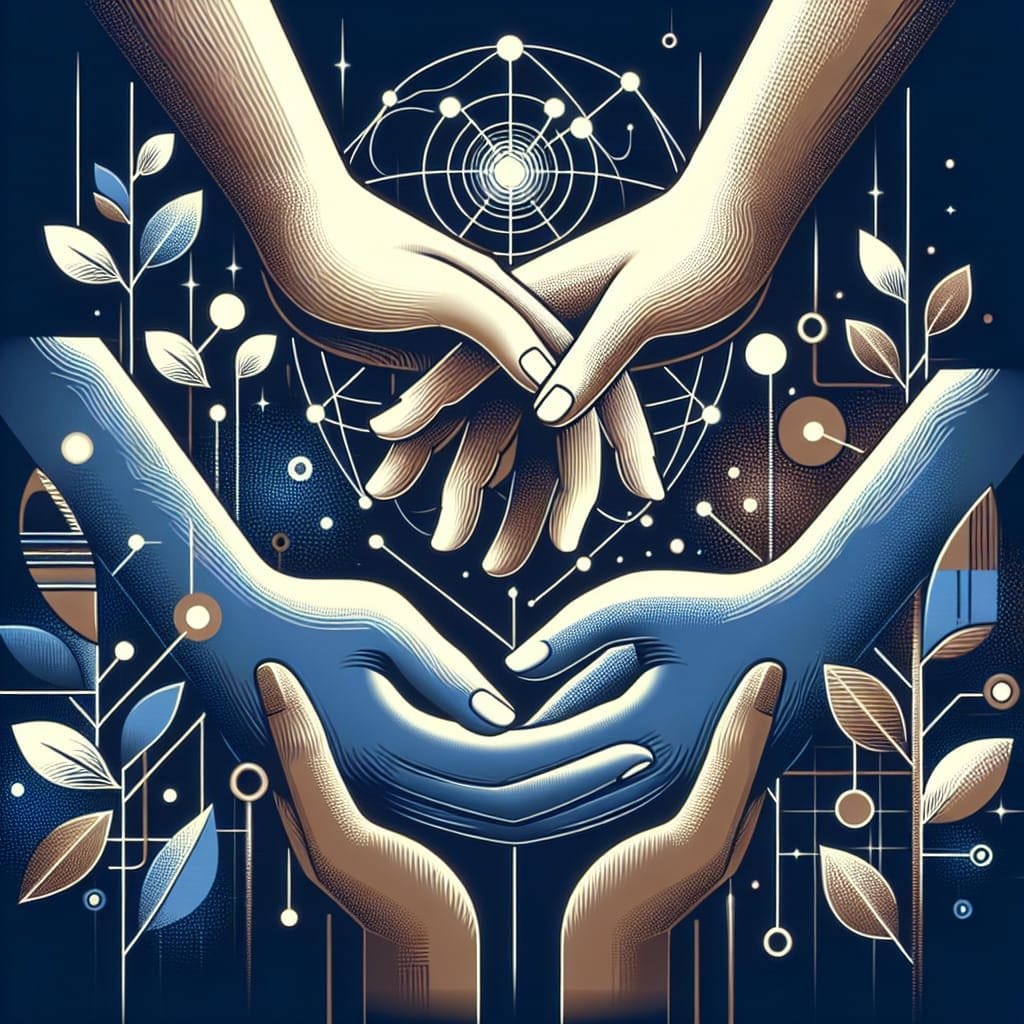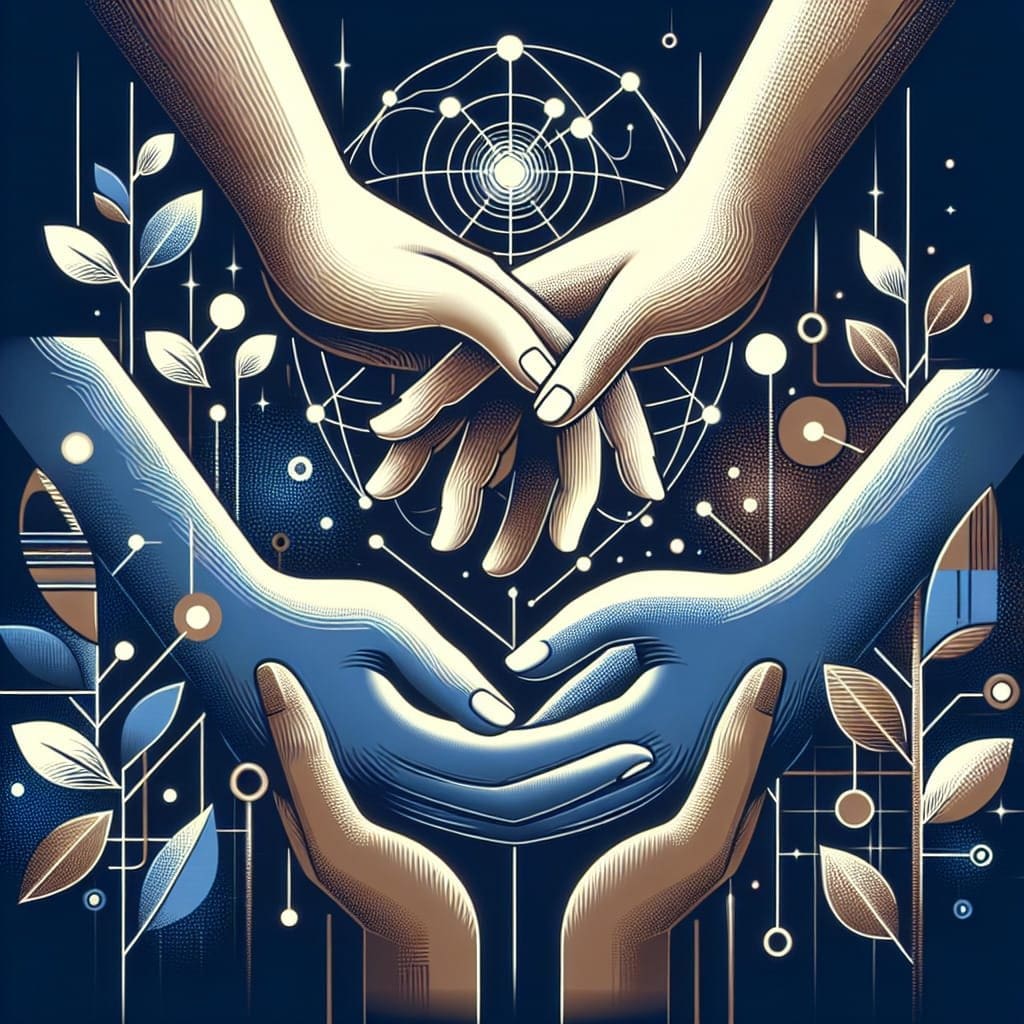In today's fast-paced world, building meaningful connections with others has become more important than ever. Whether it's in your personal or professional life, having strong relationships can bring immense joy and fulfillment. However, cultivating these connections requires certain skills that go beyond simply being friendly. In this article, we will explore ten essential relationship-building skills that can help you nurture and deepen your connections, paving the way for authentic and lasting relationships. Let's embark on this journey of building meaningful connections together.
Active Listening
Effective communication is crucial for fostering healthy and meaningful relationships. One essential skill in communication is active listening. Active listening involves fully engaging with the person you are communicating with and paying attention to their words, emotions, and nonverbal cues. By practicing active listening, you can strengthen the bond between you and the other person, establish trust, and ensure that both parties feel valued and understood. Here are some key techniques for active listening:

Maintain eye contact
Maintaining eye contact shows the other person that you are fully present and attentive to what they are saying. It demonstrates respect and interest in their perspective. By making eye contact, you are offering reassurance and letting them know that you are genuinely focused on listening.
Show genuine interest
To be an effective listener, it's important to show genuine interest in what the other person is saying. This means giving them your undivided attention, putting aside distractions, and demonstrating curiosity about their thoughts and feelings. By displaying enthusiasm and curiosity, you create an environment that encourages open and honest communication.
Ask open-ended questions
Asking open-ended questions is a powerful way to encourage the other person to open up and share more about their thoughts and experiences. Open-ended questions cannot be answered with a simple “yes” or “no” and instead prompt the person to provide more detail. This allows for a deeper understanding of their perspective and feelings.
Reflect and paraphrase
Reflecting and paraphrasing what the other person has said shows that you are actively listening and trying to understand their point of view. It involves summarizing their thoughts and feelings in your own words and repeating them back to them. This technique not only helps clarify any misunderstandings but also demonstrates empathy and validation.
Provide feedback
Providing feedback is a crucial part of active listening. It involves responding to the other person's thoughts and emotions in a supportive and constructive manner. Feedback can be in the form of affirmations, validation, or suggestions for further discussion. By offering feedback, you show that you value their input and are invested in the conversation.
Effective Communication
Effective communication is a cornerstone of any healthy relationship. It involves the clear and concise exchange of ideas, thoughts, and feelings. When communication is done effectively, it fosters understanding, resolves conflicts, and strengthens the connection between individuals. Here are some key aspects of effective communication:
Use clear and concise language
Using clear and concise language is essential for effective communication. It means expressing your thoughts and feelings in a straightforward and understandable manner. Avoid using jargon or complex words that may confuse the other person. By using clear and concise language, you ensure that your message is easily understood and minimize the likelihood of miscommunication.
Pay attention to nonverbal cues
Communication is not just about words; nonverbal cues play a crucial role in conveying meaning as well. Paying attention to the other person's body language, facial expressions, and tone of voice can provide valuable insights into their emotions and help you understand their message more fully. By being attentive to nonverbal cues, you can respond appropriately and ensure effective communication.
Practice empathy
Empathy is the ability to understand and share the feelings of another. In communication, practicing empathy involves putting yourself in the other person's shoes and genuinely trying to understand their perspective. By showing empathy, you create an environment of trust, support, and mutual understanding.
Avoid interrupting
Interrupting someone while they are speaking is a common communication barrier. It can be perceived as rude and disrespectful, preventing the other person from fully expressing themselves. Avoid interrupting and instead give the other person space to share their thoughts and feelings uninterrupted. By listening without interruption, you demonstrate respect and foster open and honest communication.
Be aware of your tone
The tone of your voice can greatly impact how your message is received. It's important to be mindful of your tone and ensure that it aligns with the intended message. Speaking in a calm and respectful tone promotes positive communication and minimizes the chances of misunderstandings or conflicts. Being aware of your tone and adjusting it accordingly can greatly enhance effective communication.
Empathy and Understanding
Empathy and understanding are fundamental to building and nurturing meaningful connections. These qualities allow us to connect with others on a deeper level, appreciate their experiences and emotions, and develop a sense of compassion and support. Here are some key practices to cultivate empathy and understanding in relationships:
Put yourself in their shoes
One of the best ways to demonstrate empathy is by putting yourself in the other person's shoes. Try to imagine how they might be feeling, what they might be going through, and what their perspective might be. This allows you to approach conversations and interactions with a greater level of understanding and compassion.
Validate their feelings
Validation is an essential aspect of empathy and understanding. It involves acknowledging and validating the other person's emotions, even if you may not share the same sentiment. By validating their feelings, you create a safe space for them to express themselves and feel heard and understood.
Acknowledge and respect differences
Every individual is unique, with their own beliefs, values, and experiences. It's important to acknowledge and respect these differences in order to cultivate empathy and understanding. Recognize that differing viewpoints can offer valuable insights and contribute to personal growth and learning.
Be patient and understanding
Patience and understanding are crucial when building meaningful connections. People may have different communication styles, experiences, and ways of expressing themselves. By being patient and understanding, you create an environment that encourages open and honest communication. This allows for deeper connections and a greater sense of trust.
Offer support and encouragement
Support and encouragement play a vital role in nurturing relationships. By offering support to others, whether through listening, providing advice, or offering a helping hand, you demonstrate empathy and understanding. Encouragement is also important, as it motivates and uplifts others, showing that you believe in their capabilities and potential.
Building Trust
Trust is the foundation of any successful relationship. It creates a sense of security, openness, and vulnerability that allows individuals to share their thoughts, feelings, and fears. Building trust requires effort and consistency. Here are some essential practices for building and maintaining trust in relationships:
/gh5VhaicC6g” frameborder=”0″ allowfullscreen>
Be reliable and consistent
Being reliable and consistent is key to building trust. It means following through on your commitments and being true to your word. When you consistently act in a trustworthy manner, others will come to rely on and trust you more.
Maintain confidentiality
Respecting confidentiality is crucial for building trust. When someone confides in you, it's important to keep their information private and not share it without their permission. Respecting confidentiality signals to others that they can trust you with their secrets and personal information.
Follow through on commitments
Following through on commitments is a way to demonstrate reliability and build trust. When you make a promise or commitment, it's important to honor it. By doing so, you show others that you are dependable and trustworthy.
Apologize and make amends
Nobody is perfect, and mistakes happen. When you make a mistake or hurt someone, it's important to apologize sincerely and make amends if possible. Taking responsibility for your actions and showing genuine remorse goes a long way in rebuilding trust.
Be honest and transparent
Honesty and transparency are essential for building trust. It means being truthful in your words and actions and not hiding information or deceiving others. When you are honest and transparent, you show that you value trust and are committed to maintaining it.
Conflict Resolution
Conflicts are a natural part of any relationship. How conflicts are resolved can greatly impact the quality and longevity of the relationship. Effective conflict resolution involves addressing issues constructively and finding mutually satisfactory solutions. Here are some key practices for resolving conflicts:
Stay calm and composed
When conflicts arise, it's important to stay calm and composed. Reacting impulsively or angrily can intensify the conflict and hinder effective resolution. Take a deep breath, listen actively, and approach the situation with a calm and rational mindset.
Listen to all parties involved
Listening to all parties involved is crucial for understanding the perspectives and concerns of each person. By giving everyone an opportunity to share their thoughts and feelings without interruption, you create an environment in which conflicts can be resolved more effectively.
Identify and address underlying issues
In many conflicts, underlying issues may be at the root of the problem. By taking the time to identify and address these underlying issues, you can develop a better understanding of the conflict and work towards finding a resolution that addresses the core concerns.
Find common ground
Finding common ground is essential for resolving conflicts. It involves seeking areas of agreement and shared interests that can serve as a foundation for compromise. By focusing on common ground, you can facilitate a more collaborative and constructive resolution process.
Collaborate on finding solutions
Conflict resolution is most effective when all parties involved collaborate on finding solutions. By encouraging open dialogue, brainstorming ideas, and considering multiple perspectives, you can work together towards a resolution that is acceptable to all.
Respect and Boundaries
Respect and boundaries are essential components of any healthy relationship. When individuals respect each other's boundaries, beliefs, and differences, they create an environment of trust, safety, and mutual understanding. Here are some key practices for fostering respect and establishing boundaries:
Treat others with respect
Treating others with respect is a fundamental aspect of healthy relationships. It means valuing their thoughts, feelings, and opinions, even if you may not agree with them. By showing respect, you create an environment that encourages open and honest communication.
Establish and communicate personal boundaries
Establishing personal boundaries is crucial for maintaining a healthy relationship. It involves clearly defining what is acceptable and what is not, both for yourself and for others. Communicating these boundaries allows for mutual understanding and respect.
Avoid making assumptions
Assumptions can lead to misunderstandings and conflict. To foster respect, it's important to avoid making assumptions about others' thoughts, feelings, and intentions. Instead, ask questions and seek clarification to gain a better understanding of their perspective.
Respect cultural differences
Cultural differences enrich relationships and contribute to personal growth. It's important to respect and appreciate these differences. By learning about and valuing other cultures, you demonstrate openness and inclusivity, fostering respect and understanding.
Value and appreciate each other
Appreciation and gratitude go a long way in promoting respect and building strong relationships. Take the time to acknowledge and value the contributions and qualities of others. By expressing appreciation, you create an environment of positivity, support, and mutual respect.
Showing Appreciation
Appreciation is a powerful tool for nurturing meaningful connections. When we express gratitude, offer compliments, and celebrate achievements, we strengthen the bond between individuals and create a positive and uplifting environment. Here are some practices for showing appreciation:

Express gratitude
Expressing gratitude is a simple yet impactful way to show appreciation. It involves acknowledging and thanking others for their contributions, whether big or small. By expressing gratitude, you let others know that their efforts are valued and appreciated.
Give compliments
Compliments are a powerful way to uplift and validate others. Take the time to recognize and highlight the strengths, qualities, or accomplishments of the people around you. By offering genuine compliments, you boost their confidence and reinforce positive behavior.
Offer support and help
Support and assistance can make a significant difference in someone's life. Offer help when you see someone in need or struggling with a task. By providing support, whether emotional or practical, you show that you care and are willing to lend a helping hand.
Celebrate achievements
Celebrating achievements is an important part of showing appreciation. Take the time to acknowledge and celebrate milestones, accomplishments, or successes of the people in your life. By recognizing their achievements, you create a sense of pride and encouragement.
Remember special occasions
Remembering special occasions, such as birthdays or anniversaries, demonstrates thoughtfulness and consideration. By acknowledging and celebrating these milestones, you show that you value the person and the relationship. Remembering special occasions fosters a sense of belonging and strengthens connections.
Flexibility and Adaptability
Flexibility and adaptability are essential qualities for navigating the ups and downs of any relationship. Life is unpredictable, and being open to new ideas, embracing change, and being willing to adapt are key to maintaining strong and meaningful connections. Here are some practices for fostering flexibility and adaptability:
Be open to new ideas
Being open to new ideas and perspectives is crucial for personal and interpersonal growth. Embrace opportunities to learn from others and consider different viewpoints. By being open-minded, you create an environment that encourages innovation and mutual respect.
Adapt to changing circumstances
Life is full of changes and unexpected circumstances. Being adaptable allows you to navigate these challenges more effectively. Embrace change and approach it with a positive mindset. By adapting to changing circumstances, you demonstrate resilience and foster stronger relationships.
Compromise when necessary
Compromise is a key aspect of maintaining healthy relationships. It involves finding middle ground and making concessions when needed. By being willing to meet others halfway, you demonstrate respect and show that you value the relationship.
Accept and embrace differences
Differences in opinions, beliefs, and values are inevitable in any relationship. Instead of viewing these differences as obstacles, accept and embrace them. Recognize that diversity contributes to personal growth and enriches relationships.
Be willing to learn and grow
Personal growth is an ongoing journey. Being willing to learn and grow not only benefits yourself but also strengthens your relationships. Be open to feedback, seek opportunities for self-improvement, and embrace challenges as opportunities for growth.
Positive Attitude
A positive attitude is a powerful asset in nurturing meaningful connections. It creates an atmosphere of optimism, support, and encouragement, fostering stronger relationships and enhancing overall well-being. Here are some practices for maintaining a positive attitude:
Maintain an optimistic mindset
Approach life and relationships with an optimistic mindset. Focus on the possibilities and opportunities instead of dwelling on negativity. By maintaining an optimistic outlook, you create a positive environment that encourages growth and resilience.
Focus on the strengths of the relationship
Every relationship has its strengths and positive aspects. Rather than focusing on weaknesses or shortcomings, direct your attention to the strengths of the relationship. By highlighting and nurturing these strengths, you foster a sense of optimism and mutual appreciation.
Be encouraging and uplifting
Support and encouragement are powerful motivators. Be a source of encouragement to the people in your life, offering uplifting words and acknowledging their efforts. By being a positive influence, you inspire confidence and strengthen the bond between individuals.
Avoid negativity and criticism
Negative energy and criticism can erode relationships. Instead of dwelling on negativity or criticizing others, adopt a constructive and positive approach. Offer support, provide constructive feedback, and focus on finding solutions rather than dwelling on problems.
Celebrate small victories
Celebrating small victories is an important part of maintaining a positive attitude. Take the time to acknowledge and celebrate even the smallest accomplishments. By doing so, you create a sense of joy and motivation, fostering a positive and supportive environment.
Time and Prioritization
Time and prioritization are key factors in building and nurturing meaningful connections. By allocating quality time, making relationships a priority, and balancing personal and professional commitments, you can create stronger and more fulfilling relationships. Here are some practices for managing time and prioritizing relationships:
Allocate quality time for the relationship
Quality time is vital for nurturing relationships. Set aside dedicated time to spend with the people who are important to you. This means being fully present, actively engaging, and fostering meaningful connections.
Make the relationship a priority
Prioritizing relationships means recognizing their importance and actively choosing to invest time and effort into them. By making the relationship a priority, you demonstrate commitment and create space for growth and connection.
Balance personal and professional commitments
Maintaining a healthy balance between personal and professional commitments is crucial for nurturing relationships. Find a balance that allows you to fulfill your personal and professional responsibilities while still dedicating time and energy to your relationships.
Show up and be present
Simply being physically present is not enough; it's important to be emotionally and mentally present as well. When spending time with others, show up fully, engage actively, and invest yourself in the moment. By being present, you demonstrate your commitment and value the relationship.
Create shared experiences
Shared experiences create lasting memories and strengthen the bond between individuals. Plan and participate in activities together, whether it's going on adventures, trying new things, or simply spending quality time in each other's company. By creating shared experiences, you build a foundation of connection and trust.
In conclusion, building and nurturing meaningful connections requires a combination of active listening, effective communication, empathy, trust, conflict resolution, respect, appreciation, flexibility, positive attitude, and time prioritization. By consciously practicing these skills and adopting these mindsets, you can cultivate stronger and more fulfilling relationships in your personal and professional life. Remember that relationships take effort and require ongoing commitment, but the rewards of deep and meaningful connections with others are well worth it.










